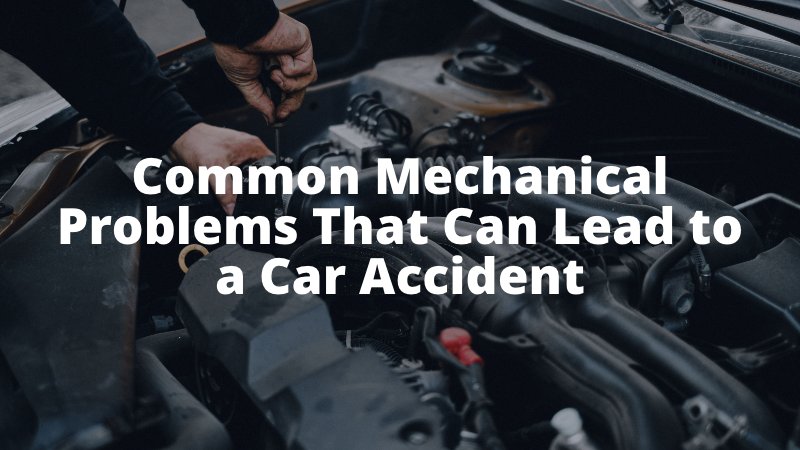Common Mechanical Problems That Can Lead to a Car Accident
Mechanical problems account for over 44,000 car accidents a year according to a study conducted by the National Highway Traffic Safety Administration (NHTSA). As a driver, it is vital to know the common mechanical problems that can lead to a car accident. This information could save your life or the lives of your loved ones.

1. Tire Failure
Tire failure is the NHTSA’s number one cause of car accidents due to mechanical problems. There are two types of tire failure: tire blowouts and worn tires.
Tire blowouts happen when a tire bursts under pressure. A blowout can occur when a tire is:
- Worn;
- Over-inflated;
- Under-inflated;
- Punctured by road debris;
- Experiencing extreme temperature changes.
A tire blowout suddenly reduces the ability to steer a car and may cause a loss of control.
Tires lose tread with time and use. The tread provides traction, prevents slipping, and maintains stopping distance. Tread can also prevent hydroplaning or loss of traction on wet, slippery roads.
Drivers should check tire pressure and tread regularly and replace tires when they show signs of wear. Unevenly worn tires may need to be replaced or aligned based on their condition.
2. Brakes
Together with tire failure, faulty brakes make up over half of all accident-causing mechanical failures according to the NHTSA. Like tires, preventative maintenance can catch the majority of brake issues such as:
- Worn brake lines;
- Brake line leaks;
- Worn brake pads and discs; and
- Anti Lock Brake System (ABS) malfunctions.
A car’s entire braking system should be inspected whenever brake pads are changed.
3. Steering, Suspension, Transmission, Engine
While only comprising 3% of accidents caused by mechanical problems, the steering, suspension, transmission, and engine systems should not be overlooked by drivers. These systems propel and maneuver a car over the road.
Once again, routine maintenance is imperative in preventing and identifying malfunctions in these systems. However, more than a visual inspection is needed to properly diagnose and remedy faulty steering, suspension, transmission, and engine issues.
Drivers should request a thorough computerized diagnostic, fluid check, and voice any concerns to their technician whenever seeking maintenance on these systems.
Who Is Liable for Mechanical Problems That Cause a Car Accident?
Overall, routine maintenance and repairs by a vehicle’s owner are the best way to avoid mechanical problems that can cause a car accident. When an owner is fastidious about maintenance, are there other parties who may be liable for a car’s mechanical problems?
- Mechanics, dealerships, or other repair facilities may be liable for car accident damages if they provided substandard repairs or failed to perform adequate service to a vehicle;
- The vehicle manufacturer or parts maker may be responsible if the system or parts that caused the accident were faulty; or
- In the case of a commercial vehicle, the owner of the vehicle, not the driver, may be liable for failure to maintain the vehicle.
It is extremely difficult to determine liability for a mechanical problem following a car accident. Contact an experienced car accident attorney for more information if you suspect a mechanical issue caused your accident.
Contact an Experienced Milwaukee Car Accident Attorney Today
If you or a loved one suffered car accident injuries through no fault of your own, contact the experienced attorneys at Mingo & Yankala, S.C. We will gladly meet with you to discuss your situation at no cost. At Mingo & Yankala, S.C., we handle all cases on a contingency fee basis, meaning there is no fee until we win compensation for you.
Car accidents involving mechanical problems are complex. Let us investigate your case and handle the insurance companies so you can focus on healing. Reach out to Mingo & Yankala S.C. today at our Milwaukee office.
